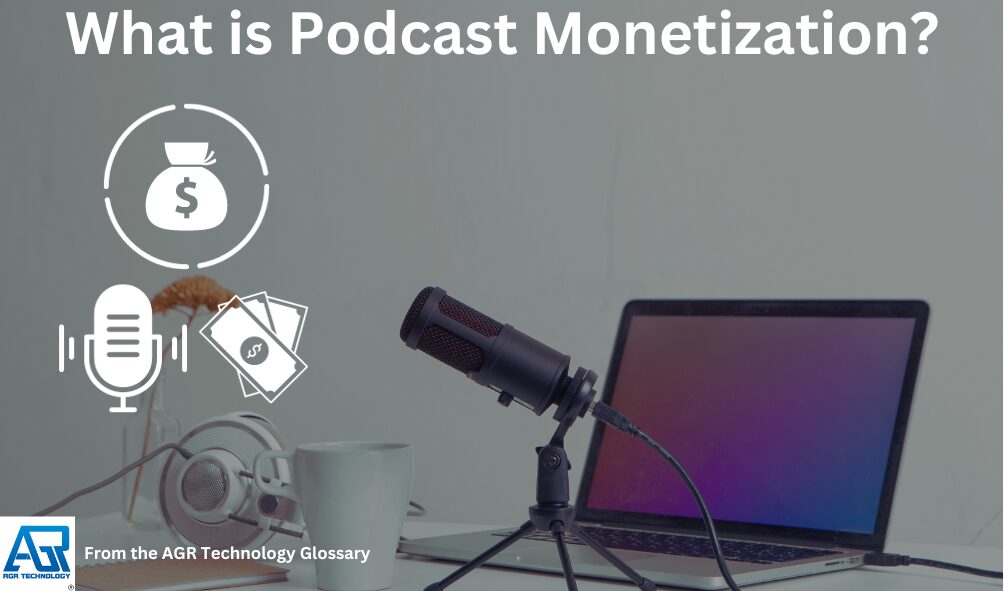What is Podcast Monetization? Understanding Revenue Streams for Podcasters

Podcast monetization refers to the various methods podcasters can use to generate revenue from their audio content. As the podcasting industry experiences significant growth, creators are increasingly seeking ways to capitalize on their efforts. The journey to monetization typically involves growing and maintaining a dedicated listener base while integrating revenue streams such as advertising, sponsorships, subscriptions, or sales of related products and services. The primary goal is to turn the podcast into a profitable venture by leveraging the audience that a podcaster has built thus forming long-term value for many months and years to come.
If you have decided to start a podcast for yourself or your business, done your market research and chosen a podcast hosting service the next step is working out the most appropriate monetization model to ensure your podcast has a good chance to make some money.
Gaining a deep understanding of the audience is crucial in podcast monetization. This comprehension enables podcasters to tailor content that resonates with listeners, creating a loyal following. With a devoted audience in place, podcasters can attract advertisers willing to pay for exposure to that specific demographic. Furthermore, exploring other revenue avenues, such as offering exclusive content or merchandise, can further enhance a podcast’s profitability. Podcasters often need to balance monetization efforts with the authenticity and quality of their content to maintain listener trust and satisfaction.
Key Takeaways
- Podcast monetization encompasses a range of strategies to generate income from audio content
- Building a loyal audience is essential to attracting advertisers and implementing effective monetization methods
- Diversifying revenue streams can lead to a more sustainable and profitable podcasting business
Understanding strategies to monetize your podcast
–>>Click here to signup for a Podbean account<<–
–>>Click here to signup for a Podbean account<<–
Monetization Fundamentals
Monetization technique in podcasting is multi-faceted, often starting with the fundamental decision of how to provide value to both listeners and potential sponsors. At its core, monetization options are centered on leveraging the podcast’s audience to generate an income stream. The value of a podcast to advertisers is often correlated with the number of downloads and the engagement level of the audience. Podcast monetization is not a one-size-fits-all model; it must be tailored to fit the style, audience, and goals of the podcast.
Revenue Models in Podcasting
Several revenue models exist within the realm of podcasting to monetize content effectively, here are some example methods that may be used to monetize:
- Ads and Sponsorship: Direct revenue is generated through the inclusion of ads in episodes or securing sponsorship deals. Advertisers pay for podcast ad slots with costs often measured per thousand downloads or views (CPM)
- Donations and Crowdfunding: Podcasters may also receive funding directly from their audience through donations or platforms dedicated to crowdfunding
- Affiliate Marketing: This involves earning a commission when listeners purchase products or services that the podcaster recommends, tracked through affiliate links
- Ecommerce Shop: Starting a website to sell branded products or services like coaching or even digital items like courses through an LMS
- Premium Content: Offering premium content, such as ad-free episodes or exclusive material, for a fee is another method to monetize a podcast
Each monetization option has differing implications on revenue, and podcasters typically benefit from employing a mix of these techniques to diversify their income streams.
Maximizing Revenue through Advertising
To ensure a profitable podcast, creators can focus on two primary channels for advertising revenue: direct partnerships with advertisers and leveraging advertising networks. Effective implementation of these strategies is crucial for maximizing ad earnings.
Working with Advertisers
When podcasters work directly with advertisers, they offer a tailored advertising experience that can take the form of host-read ads, a method known for its personal touch and effectiveness. These ads typically command a higher CPM (Cost Per Mille) rate due to their integrated nature and the host’s personal endorsement. Building strong sponsorship deals requires podcast creators to understand their audience and present compelling data to potential sponsors that showcase the value of their listener base.
Leveraging Advertising Networks
Alternatively, podcasters can partner with a podcast advertising network such as AdvertiseCast or Midroll, which connects them with multiple advertisers looking for the right audience match. Networks simplify the ad sales process and often offer automated ads, which are dynamically inserted into podcasts regardless of when they’re downloaded or listened to. The recent introduction of the Spotify Audience Network also indicates a trend towards more refined targeting and ambassador ads, which are endorsed by hosts who can genuinely advocate for the advertiser’s products or services.
By utilizing a combination of host-read ads, automated solutions, and leveraging the services of advertising networks, podcasters can create a sustainable revenue stream from their content.
Enhancing Listener Engagement for Better Monetization
To effectively monetize a podcast, creators must focus on engaging their listeners deeply, thereby increasing the value proposition for both advertisers and consumers of the content. Engaging an audience can not only drive revenue through traditional channels such as advertising but can also open up novel streams like exclusive memberships or direct listener support.
Offering Exclusive and Bonus Content
Podcasters looking to enhance monetization should consider providing exclusive content. This content is typically accessible to members or subscribers who support the podcast through platforms such as Patreon. By offering items like premium episodes or behind-the-scenes insights, podcasters can incentivize listeners to participate in these premium tiers. Events such as live Q&A sessions add value, transforming passive listeners into active community members.
- Examples of Exclusive Content:
- Bonus episodes
- Early access to regular episodes
- Ad-free listening experience
Building a Dedicated Community
The core of any successful monetization strategy is a dedicated community. Podcasters can leverage social media to build a rapport with their audience, thereby increasing viewership and engagement. Benefits like shout-outs on episodes or branded merchandise can serve as additional perks. Services that foster interaction, such as discussion forums or online meet-ups, create a sense of belonging amongst listeners, strengthening their commitment and willingness to support the podcast financially.
- Community Engagement Strategies:
- Regular interaction on social media platforms
- Exclusive online events for community members
- Creation of discussion groups or forums
This approach to incorporating exclusive content and fostering a community can organically grow a podcast’s audience and engagement levels, resulting in improved monetization potential.
Diversifying Income Streams

For podcast creators, diversifying income streams refers to the process of generating revenue from multiple sources, ensuring financial stability and minimizing reliance on any single monetization method. This strategy can include products, services, and various types of content-related sales.
Selling Branded Merchandise
Podcasters often develop their own line of branded merchandise to sell directly to their audience. This can range from t-shirts, hoodies, and stickers to more unique items that resonate with their brand’s ethos. Utilizing merchandising tools, creators can offer their listeners a way to support the podcast while receiving a physical product in return.
- Products: Customized items linked to the podcast’s theme
- Brands: Coherent brand identity on all merchandise
- Services: Use of e-commerce platforms to sell and distribute products
- Merchandise: Includes a variety of items like clothing and accessories
- Selling Merch: Integration with podcast promotions and mentions
Exploring Alternative Revenue Avenues
Aside from merchandise, podcast creators often tap into alternative revenue streams such as affiliate marketing, where they earn a commission for promoting other brands’ products. Sponsorships are another significant avenue, wherein brands pay for exposure to the podcast’s audience. Additionally, podcasters may offer podcast subscriptions, listener support options, courses, coaching sessions, and live events to provide value and generate income.
- Affiliate Marketing: Partner with brands to promote products for a commission
- Commission: Earnings obtained from referred sales through affiliate links
- Sponsorships: Form partnerships with companies for financial support
- Podcast Subscriptions: Exclusive content or ad-free listening for a fee
- Listener Support: Direct donations from listeners via patronage platforms
- Courses/Coaching: Paid educational content or personal guidance
- Live Events: Ticketed gatherings or performances for fans online or offline
The Business Aspects of Podcasting
In the realm of podcasting, commercial success often hinges on building robust monetization strategies and understanding the multifaceted podcast market. Podcasters strive to secure financial stability and growth through a combination of sponsorships, strategic partnerships, and targeted advertising.
Strategic Partnerships and Sponsorship
Podcasters seeking to monitize their content frequently establish strategic partnerships with brands and services that align with their podcast’s theme and audience. Sponsorship deals are a primary revenue source for many successful podcasts, with podcast ads being integrated into the content in a way that adds value for listeners. These relationships rely on detailed negotiation and often commence with a one-pager that summarises the podcast’s statistics, such as listener demographics and episode performance.
Sponsors typically look for podcasts that have established a niche audience to ensure that their message resonates strongly with listeners. Figures such as Joe Rogan have demonstrated the potential for podcasts to reach extensive audiences, prompting numerous brands to invest in the medium. The U.S. podcast industry has seen significant growth in this regard, with more companies looking to form partnerships with podcasters who have cultivated a loyal and engaged listener base.
Understanding Podcasting Market Dynamics
The podcast market is dynamic and competitive. Both new entrants and established podcasters aim to grasp the intricacies of publishing and delivery to scale their productions. Podcast advertising networks play a key role, acting as intermediaries that connect podcasts with potential sponsors. These networks facilitate the sale and insertion of podcast ads, enabling podcasters to monetize their content effectively.
Understanding the podcast industry’s market dynamics is crucial for podcasters. They must stay informed about current trends, audience preferences, and the rise of audio on-demand. Such knowledge empowers podcasters to make informed decisions about content creation, episode frequency, and advertising methods. Tailoring content to listener trends while maintaining a unique voice is vital for a successful podcast.
Other related content:
Source(s) cited:
“tandfonline” www.tandfonline.com/doi/abs/10.1080/17510694.2021.1890417. Accessed 14 Jan. 2024.
Frequently Asked Questions
Understanding podcast monetization requires insight into the various methods and platforms available to creators, as well as the influential metrics and strategies that can maximize revenue potential.
How can podcast creators generate revenue from their shows?
Podcasters can earn money through several channels, including sponsorships, listener donations, merchandise sales, live event hosting, and premium content offerings. Services like Anchor.fm facilitate advertising revenue for user-produced podcasts.
What platforms are available for podcasters to monetize their content?
There are a variety of platforms such as Spotify, Apple Podcasts, and Google Podcasts that offer monetization options. Additionally, hosting services like Podbean and Libsyn provide tools to help podcasters earn revenue.
What are the typical requirements for monetizing a podcast on Spotify?
To monetize on Spotify, podcasters generally need to fulfill criteria such as having a minimum number of listeners, creating consistent content, and adhering to Spotify’s content policies.
What metrics determine the profitability of a podcast?
Profitability is often gauged by listener count, engagement rates, episode download numbers, and audience demographics. Higher engagement and targeted demographics can attract more lucrative sponsorship deals.
What strategies can be employed to enhance the monetization potential of a podcast?
Strategies to increase monetization include optimizing content quality, targeting niche markets, leveraging social media for promotion, and building a loyal audience base. Implementing a subscription model can provide consistent revenue.
What are common methods for calculating potential earnings from a podcast?
Potential earnings can be calculated based on cost per mille (CPM) rates for ads, expected listener donations, or subscription fees. Utilizing industry benchmarks for sponsorship deals can also help estimate potential revenue.
![logo-new-23[1] logo-new-23[1]](https://agrtech.com.au/wp-content/uploads/elementor/thumbs/logo-new-231-qad2sqbr9f0wlvza81xod18hkirbk9apc0elfhpco4.png)